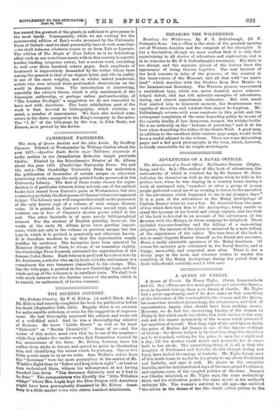The story of Queen Anelida and the false Arcite. By
Geoffrey Chaucer. Printed at Westminster by William Caxton about the year 1477.—Agustini Dacti Scribe super Tullianis elogancijs et eerbis exoticis tin stta faoundissinta Bothorica inoipit prof-nate libellus. Printed by the Schoolmaster Printer at St. Albans about the year 1479. (Cambridge University Press. 10s. and 15s. net.)—The Cambridge University Press has undertaken the publication of facsimiles of certain unique or otherwise interesting works among the early printed books preserved in the University Library. The first of these works chosen for repro- duction is of particular interest, being not only one of the earliest books that issued from Carton's press at Westminster, but also containing probably the first poems of Chaucer's that ever appeared in type. The Library may well congratulate itself on the possession of the only known copy of a volume of such unique literary value. It is printed in Carton's well-known second type, and contains one or two of Chaucer's shorter poems added at the end. The other facsimile is of more purely bibliographical interest. For the student of English printing, however, the works of the early St. Albans press have peculiar import- ance; while not only is the volume in question unique, but the type in which it is printed is practically not otherwise known. It is therefore needless to say that the reproduction amply justifies its existence. The facsimiles have been executed by Monsieur Dujardin of Paris, to whom, if we remember rightly, the Cambridge Press formerly entrusted the reproduction of the famous Coder Bezae. Each volume is prefaced by a short note by Dr. Jenkinsen, a scholar who redly loves with the enthusiasm of a connoisseur the rare treasures committed to his charge. This, like the title-page, is printed in the now Cambridge type, and the whole get-up of the volumes is in excellent taste. We shall look with much interest for the further issues of the series, which is to consist, we understand, of twelve volumes.


















































 Previous page
Previous page